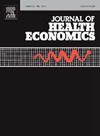过敏影响下的驾驶:季节性花粉对交通事故死亡的影响。
IF 3.6
2区 经济学
Q1 ECONOMICS
引用次数: 0
摘要
尽管交通事故是可以预防的,但它仍然是美国人死亡的主要原因。虽然已经采取了若干政策来改善交通安全,其影响也有充分的记录,但暂时的健康冲击或情境因素在解释致命交通事故变化方面的作用尚未得到充分研究。在探索城市特定花粉数量的日常变化时,这项研究发现了新的证据,即在当地花粉数量特别高的日子里,交通死亡人数会增加。我们发现,这种影响在涉及私家车的事故中存在,而且最常发生在周末,这表明可能错过了避免这些死亡的机会。我们在车队中没有发现类似的效果。这些发现对于高花粉计数的其他规格和其他定义仍然是可靠的。综上所述,本研究发现了一种普遍而短暂的外源性健康冲击,即花粉过敏,会增加交通死亡人数的证据。鉴于我们缺乏回避的证据,这些影响不是机械的,很可能是由季节性过敏引起的认知障碍造成的。本文章由计算机程序翻译,如有差异,请以英文原文为准。
Driving under the influence of allergies: the effect of seasonal pollen on traffic fatalities
Traffic fatalities are the leading cause of mortality in the United States despite being preventable. While several policies have been introduced to improve traffic safety and their effects have been well documented, the role of transitory health shocks or situational factors at explaining variations in fatal traffic accidents has been understudied. Exploring daily variation in city-specific pollen counts, this study finds novel evidence that traffic fatalities increase on days in which the local pollen count is particularly high. We find that the effects are present in accidents involving private vehicles and occur most frequently on the weekends, suggesting potentially the missed opportunity to avoid these fatalities. We do not find similar effects for fleet vehicles. These findings remain robust to alternative specifications and alternative definitions of high pollen count. Taken together, this study finds evidence that a prevalent and transitory exogenous health-shock, namely pollen allergies, increases traffic fatalities. Given our lack of evidence of avoidance, these effects are not mechanical and are likely driven by cognitive impairments that arise as a result of seasonal allergies.
求助全文
通过发布文献求助,成功后即可免费获取论文全文。
去求助
来源期刊

Journal of Health Economics
医学-卫生保健
CiteScore
6.10
自引率
2.90%
发文量
96
审稿时长
49 days
期刊介绍:
This journal seeks articles related to the economics of health and medical care. Its scope will include the following topics:
Production and supply of health services;
Demand and utilization of health services;
Financing of health services;
Determinants of health, including investments in health and risky health behaviors;
Economic consequences of ill-health;
Behavioral models of demanders, suppliers and other health care agencies;
Evaluation of policy interventions that yield economic insights;
Efficiency and distributional aspects of health policy;
and such other topics as the Editors may deem appropriate.
 求助内容:
求助内容: 应助结果提醒方式:
应助结果提醒方式:


